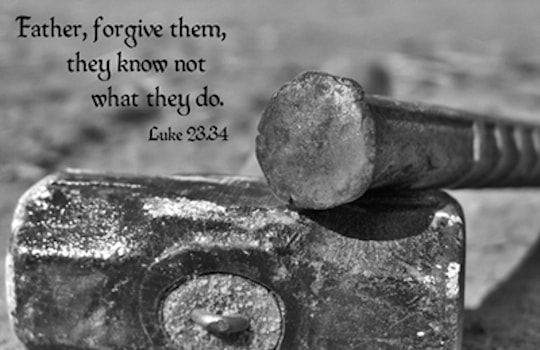|
Throughout the year, the Southern New England Conference of the United Church of Christ reproduces the Daily Lectionary for use by churches. These are the suggested readings for April 1st: Psalm 126; Isaiah 43:8-15; and Philippians 2:25—3:1. I would encourage you to read these short selections as part of your Lenten practice.
Today is our fifth Lenten Friday. We are only two weeks from Good Friday, the day of Jesus’ humiliation, torture and public execution on the cross. Lenten Fridays anticipate this sacred, humbling act of God’s perfect love for all of us – and it really is for all of us. Let’s think about that. When Luke tells the story of Good Friday in chapter 23, he includes one verse that no other Evangelist does, and some biblical editors even wished that Luke had not. If you go to your Bibles and look at vs 34, you may see it printed within double brackets like this [[ ]]. If so, there should also be a footnote that informs the reader that vs 34 is not found in some ancient sources. Bibles today reach back to original, ancient sources as much as they can, and all of these ancient sources do not agree all the time. Many of these discrepancies are minor, but some are extremely telling. Vs. 34 is the latter. Vs. 34 is included in my NRSV of the Bible, which means that the committee of scholars has judged that it most likely was part of the original text of the Gospel, but that there is enough evidence accepted by enough scholars that this decision could not be made without reservation, and thus the double brackets. I agree that it should be included in the text because an argument can be made for why an ancient biblical scribe would have made the choice to omit vs. 34 when he was copying the text: it can be scandalous in a practical sense. If Jesus is to forgive even the ones who have hammered nails into His sacred flesh, then what does this mean for the followers of a crucified Saviour? This is a radical, absolute, unbending notion of forgiveness. It is a forgiveness without merit for we are told: “The soldiers also mocked [Jesus] …” (Luke 23:36) This is a preemptive forgiveness that comes from the innermost depths of Jesus’ being. It’s who Jesus is. A scribe who may have been more self-righteous than his position merited may have chosen to simply skip vs. 34 because such a forgiveness left a bad taste in his mouth. Since an argument can be made for why a scribe would exclude it, and since it is such a problematic and difficult text to deal with, it makes sense to see why it would be removed from the original text and why it would not have been added to the original text. This is why I believe that Luke intended for us to know that Jesus was impractically forgiving – not only forgiving to those who think they deserve forgiveness or even to those who ask but don’t think they deserve it (cf. Luke 18:9-14) but to everyone, even to the soldiers who were still mocking Jesus when He prays, “‘Father, forgive them, for they know not what they do.’” The transition may seem course, but today is April Fool’s Day. It originated around a calendar change. April 1st was once considered the beginning of the New Year and was based on the newness of Spring. When the New Year was moved to January, some hung on stubbornly to the old way of calling April 1st New Year. These were the April Fools. April Fools maintained their way of thinking no matter what. Jesus on the cross reveals the hidden, inexplicable, ineffable nature of the divine. To the human mind it is not practical, to the point that some anonymous scribe removed vs. 34 from the sacred text because he could not understand or appreciate it. Some will insist on maintaining the human perspective of deserved forgiveness rather than embrace the costly example of the cross’ teaching on divine forgiveness. None of us is worthy of a crucified God, which makes all of us to one degree or another dependent upon the forgiveness Jesus preaches so perfectly and so costly on the cross. This we need to embrace for ourselves and to live in our relationships with others. We can’t hold on to our practical way of thinking no matter what when it costs Jesus the cross to show us otherwise. It says in Isaiah, in a different context, but still applicable here on this Lenten Friday: “You are my witnesses, says the Lord, and my servant whom I have chosen, so that you may know and believe me and understand that I am he.” We are Christ’s witnesses and Christ is God’s perfect witness. It is our calling to share, in word and action, everything Jesus taught and lived with others, even the difficult lessons of an impractical forgiveness. If you’d like, here is the link to the Southern New England Conference’s daily reading schedule: www.sneucc.org/lectionary.
0 Comments
Leave a Reply. |
NewsFaith, love and chitchat. Categories
All
Archives
June 2024
Follow
|
|
SERVICE TIMES
Sunday 9:30-10:30am Children Sunday School 9:30-10:30am Nursery care available during worship DONATE Make a single or recurring contribution by clicking here |
FOLLOW
|

 RSS Feed
RSS Feed
